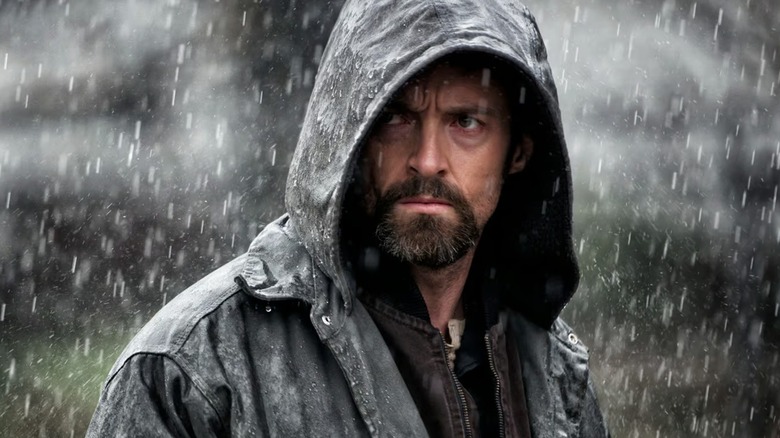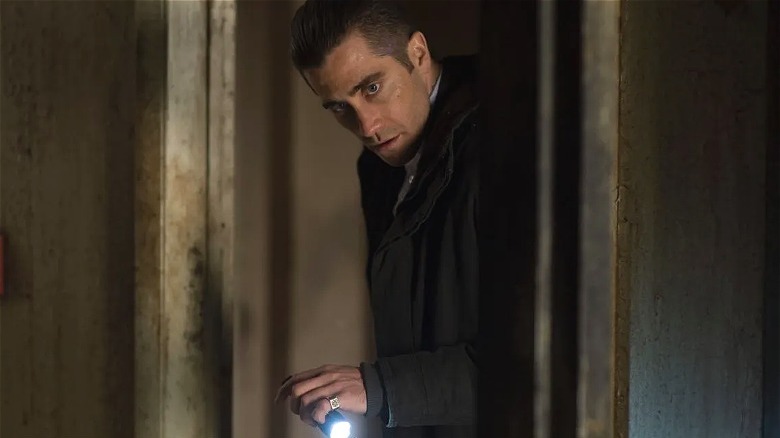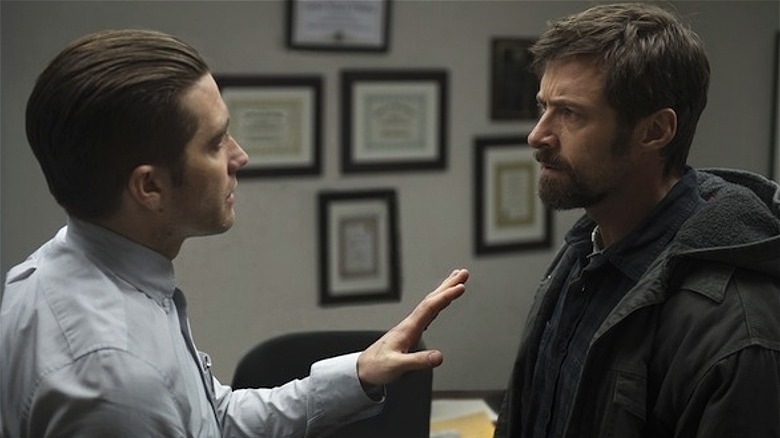Hugh Jackman's Prisoners Is Topping Netflix Charts, And It Deserves Your Attention
This post contains spoilers for "Prisoners."
In Denis Villeneuve's symbolism-laden "Prisoners," every individual finds themselves trapped in mental labyrinths of their own making. While these mental prisons are taxing enough, living in a world that is as arbitrarily heinous as the one in "Prisoners" can break even the toughest, most resilient folks. So, why is a film as bleak as this topping Netflix charts at the moment? The answer is simple: "Prisoners" is a tense, dreary detective noir that is tinged with a glimmer of hope, with an ending that underlines that salvation, although hard-earned, is possible.
The film opens with survivalist Kelly Dover (Hugh Jackman), who is the kind of person to preemptively arm himself against any potential disaster, including world-ending scenarios. Dover's pantry is always stocked with emergency canned food and his hunting trips with his teenage son are extensions of his overly-cautious worldview, where the world is akin to a battlefield where only the strong survive. "Life is a hunt, in which, you're either the predator or the prey", muses Dover, imparting this rather dismal piece of advice to his kid. Being devoutly religious, Dover arms himself with hardened self-righteousness and is prepared to protect his family from any and all harm, no matter what the cost.
How would such a man act when pushed to the brink of losing someone he loves dearly? Dover's world descends into chaos when his six-year-old daughter Anna (Erin Gerasimovich) goes missing along with Jenny, the daughter of his neighbors across the street. This is undoubtedly a kidnapping and Dover is understandably at his wit's end, and with the thorough, determined Detective Loki (Jake Gyllenhaal) thrown into the mix, things ought to get better — but with every murky discovery, the impossible nature of the labyrinth unfolds, with the exit becoming elusive by the minute.
More than a by-the-book suspense thriller
It is not difficult to understand why "Prisoners" still has a hold over audiences, despite being released 10 years ago. While it sports the markings of an atmospheric noir, the film dives deep into its characters' mental landscapes and offers complex answers to questions that haunt us after the credits roll. The labyrinth is more than a visual metaphor here: it is a literal maze of morality, faith, and trauma that festers in violent cycles that occur either due to depravity or desperation.
There are several suspects littered along the path who appear as perpetrators capable of such a violent act, but these clues only end up obscuring the larger picture and leading Loki astray. There's David Dastmalchian's Bob Taylor, who emerges as more of a victim than someone who would actively hurt someone, and Paul Dano's Alex, whose presence around the time the girls were last seen is one of the only connecting threads to his involvement with the kidnapping. Both men — Loki and Dover — are in pursuit of the truth, but the methods they engage in are molded by their respective worldviews and the unhealed trauma that they carry without closure.
What makes "Prisoners" so compelling is not the unsolvable nature of its central case, but how it affects everyone involved in it. For Dover, finding his daughter is his only priority and his parental instincts, mixed with justified retribution, push him to a point of no return. When faced with such a depressing, desperate situation, even a religious man like Dover willfully commits acts that he would otherwise deem as sins, while rigidly believing that his actions were justified all along. However, when proven wrong, it is only a matter of time before his single-minded resilience shatters and cuts him deep.
The art of suspense
Denis Villeneuve understands how subtext is crucial to injecting genuine suspense into a hopeless puzzle begging to be solved, especially one with dreadful repercussions. Dover and Loki are inevitably in a race against time, where even the smallest oversight can threaten two innocent lives and allow the perpetrator to evade punishment. By the time the real antagonist is revealed and things take a turn for the better, a sense of hopelessness still pervades. All is not well, as something crucial has been overlooked, which comes back to haunt Loki when he hears Anna's red whistle go off.
This is exactly where Villeneuve decides to cut to black and end "Prisoners," with Dover's fate hanging in the air. At first glance, this ending might feel jarring, unfair even, given the nature of trials that the two men go through, and how close Loki was to getting lost in a mini-maze, had he not exercised his intuition. However, the ending of "Prisoners" isn't as interpretative as one might think, as the key to understanding it has been planted way before the climax occurs. There is no way Loki will ignore the nagging sense of unease in his mind — someone as obsessively thorough will unearth more truths, no matter how deeply concealed. After all, Loki feels the weight of the world on his shoulders and he is doomed to carry that weight forever.
Nevertheless, the biting suspense of the ending is only half-resolved, even when an optimistic outcome is taken into consideration. The world is cruel and unforgiving, and so are the mental prisons that trap us into enacting certain behavioral patterns. However, there is still hope, no matter how feeble, just like the faint, muted sounds of the red whistle that can be heard in the end.


